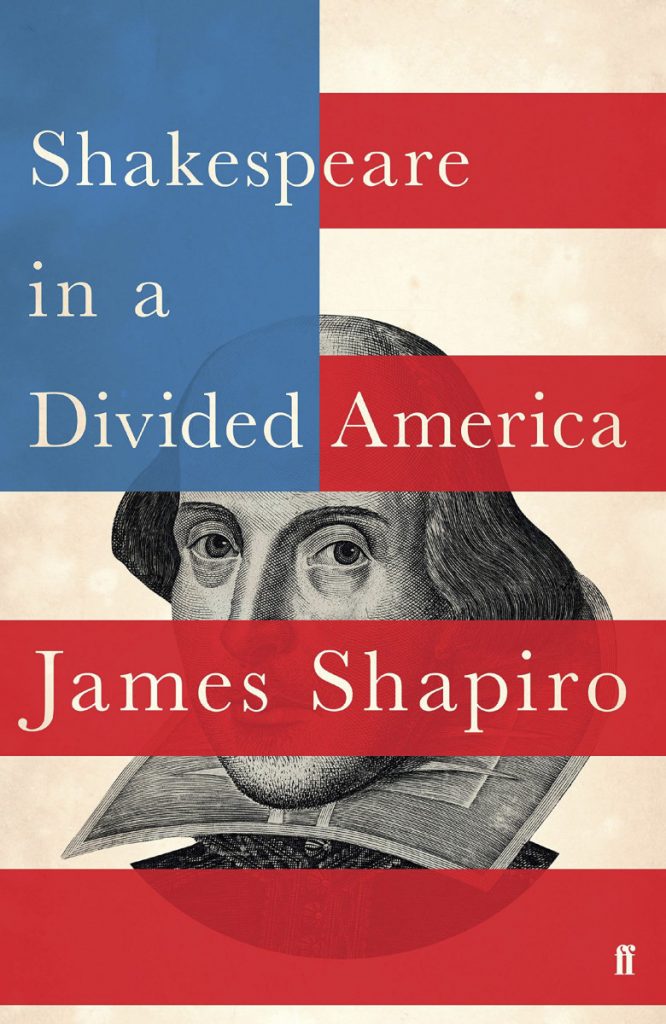SARAH VEST – STAFF WRITER

The works of William Shakespeare are taught across the country in everything from middle schools to colleges. One of Week Four’s Chautauqua Literary and Scientific Circle author of Shakespeare in a Divided America: What His Plays Tell Us About Our Past and Future, James Shapiro, thinks that one of the reasons Shakespeare’s works are so prolific in the United States is because people can see conflicts reflected back at them in the plays.
Shapiro’s CLSC presentation was broadcast on the CHQ Assembly Video Platform on March 21; it is still available for streaming. At 4 p.m. EDT Thursday, July 22 on CHQ Assembly, selections from that event will be included in a CLSC Special Week Four Program, with commentary on the book from Chatuauqua Theater Company Artistic Director Andrew Borba.
“Shakespeare has become more American than British now. And we have more Shakespeare Festivals than England, and we have more theaters for Shakespeare than England,” said Sony Ton-Aime, the Michael I. Rudell Director of the Literary Arts. “… No other writer explains America better than Shakespeare. The struggles that the characters go through are very similar to what America is feeling.”
Shapiro studied at Columbia University and the University of Chicago. He is currently the Larry Miller Professor of English and Comparative Literature at Columbia University, where he has taught since 1985. In 2011 he was inducted into the American Academy of Arts and Sciences. His essays and reviews have appeared in The New York Times, The New Yorker and The Guardian. He is the author of seven books. His latest — Shakespeare in a Divided America — was a New York Times “Ten Best Books of 2020” as well as a finalist for the National Book Critics Circle award for nonfiction. He serves on the Board of Directors of the Royal Shakespeare Company, and is currently the Shakespeare Scholar in Residence at the Public Theater in New York City.
“Great productions of Shakespeare always connect with a cultural moment,” Shapiro said.
The version of history that he was taught in school “had very little to do with the realities of the American experience,” he said. By using Shakespeare’s plays, Shapiro hopes to highlight the way certain histories have been ignored or suppressed, and that through the lens of theater, people will be able to discuss them.
He points to Othello and President John Quincy Adams, who was an abolitionist but was unable to handle the idea of a white woman being in love with a Black man. Adams’ fears of miscegenation do not resonate with modern readers, but they remain a part of the history of the play.

More recently, the musical Kiss Me, Kate — a retelling of The Taming of the Shrew — speaks directly to how women were pushed out of the workforce in the years following World War II. The play engages the plight of women who have to give up their independence whether it’s set in Renaissance-era Europe or postwar America.
In his CLSC presentation, Shapiro wanted to focus on Macbeth, a play read by both Abraham Lincoln and his assassin John Wilkes Booth. He says that when Lincoln reads Macbeth, he sees a “deeply introspective hero,” one that resonates with his own feelings of guilt over a war in which upward of 700,000 Americans died.
Booth, an actor that had appeared in a number of Shakespeare productions — including Julius Caesar — would read the same lines and see a heroic martial soldier. Shapiro refers to him as a “Lost Cause type.”
“Shakespeare is one of those places where we can still air our differences and stake a claim,” Shapiro said. “… You can have the very same words read in radically different ways, but at least they’re both engaging in a literary text.”
His book ends in the summer of 2017, when a production of Julius Caesar at the Delacorte Theater in New York City featured a Donald Trump look-alike playing Caesar.
“I use Shakespeare as a kind of core sample of where our culture is,” Shapiro said.
This is not the first time a president look-alike has played Caesar — two years previous, a Barack Obama look-alike played the central role. However, in 2017, Trump supporters appeared and threatened violence against the actors and the director.
“Great theater lets us see things in our culture before they happen,” Shapiro said. “The violent storming of the stage, night after night, the last week of the run was a nice dress rehearsal for Jan. 6 and the storming the Capitol by the same exact kinds of people who believe that in the cult of Donald Trump, and did not believe in the rule of law, and free expression.”
From Shapiro’s perspective, Americans are not good at talking about what they disagree over. The lack of common ground makes having a vehicle that both parties can understand even more important.
“The issues that divide us are issues of gender, issues of immigration, issues of race and issues of inclusion,” Shapiro said. “Wonderfully, Shakespeare’s plays are about all of those things. And rather than being canceled because of that, the left and the right for the last 200 years or so have both embraced Shakespeare.”




